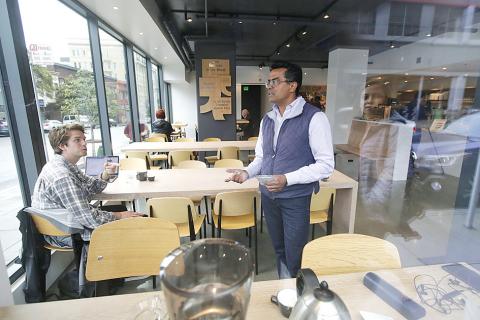A California cafe is brewing up what it calls the world’s most expensive coffee — at US$75 a cup.
Klatch Coffee is serving the exclusive brew — the Elida Natural Geisha 803 — at its branches in southern California and San Francisco.
The 803 in the coffee’s name refers to the record-breaking US$803 per pound (0.45kg) the organic beans sold for at a recent auction after winning the Best of Panama coffee competition, said Bo Thiara, co-owner of the Klatch branch in San Francisco.

Photo: AP
He calls the annual competition the coffee world’s equivalent of the Oscars.
Only 45kg of the beans were available for purchase, and most went to Taiwan, Japan and China, Thiara said.
Klatch secured 4.5kg and is the only chain in North America to have it.
The coffee’s high quality and limited supply set off a bidding war that determined its astronomical price, topping last year’s winning beans that sold for US$601 per pound, Thiara said.
Klatch describes the coffee as a rare variety of Arabica from Panama that has a floral, tea-like flavor with hints of jasmine and berries.
The 4.5kg of beans would produce about 80 cups of coffee, Thiara said.
A few lucky coffee lovers on Wednesday got to try free samples at the San Francisco branch, where promotional signs are on display advertising the “World’s Most Expensive Coffee.”
One of them was San Francisco resident Lauren Svensson, who said it was “very different” from any coffee she had ever tasted.
“My mind was a little blown about the fact that a US$75 cup of coffee even exists, but it was shockingly good,” she said.
Her friend, Charlie Sinhaseni, also gave his free sample a positive review.
“When I first looked at it, I thought it would be hyperpretentious, and I would think of all the different notes for the coffee, but I was too busy enjoying it,” he said.

On Ireland’s blustery western seaboard, researchers are gleefully flying giant kites — not for fun, but in the hope of generating renewable electricity and sparking a “revolution” in wind energy. “We use a kite to capture the wind and a generator at the bottom of it that captures the power,” said Padraic Doherty of Kitepower, the Dutch firm behind the venture. At its test site in operation since September 2023 near the small town of Bangor Erris, the team transports the vast 60-square-meter kite from a hangar across the lunar-like bogland to a generator. The kite is then attached by a

Foxconn Technology Co (鴻準精密), a metal casing supplier owned by Hon Hai Precision Industry Co (鴻海精密), yesterday announced plans to invest US$1 billion in the US over the next decade as part of its business transformation strategy. The Apple Inc supplier said in a statement that its board approved the investment on Thursday, as part of a transformation strategy focused on precision mold development, smart manufacturing, robotics and advanced automation. The strategy would have a strong emphasis on artificial intelligence (AI), the company added. The company said it aims to build a flexible, intelligent production ecosystem to boost competitiveness and sustainability. Foxconn

Leading Taiwanese bicycle brands Giant Manufacturing Co (巨大機械) and Merida Industry Co (美利達工業) on Sunday said that they have adopted measures to mitigate the impact of the tariff policies of US President Donald Trump’s administration. The US announced at the beginning of this month that it would impose a 20 percent tariff on imported goods made in Taiwan, effective on Thursday last week. The tariff would be added to other pre-existing most-favored-nation duties and industry-specific trade remedy levy, which would bring the overall tariff on Taiwan-made bicycles to between 25.5 percent and 31 percent. However, Giant did not seem too perturbed by the

TARIFF CONCERNS: Semiconductor suppliers are tempering expectations for the traditionally strong third quarter, citing US tariff uncertainty and a stronger NT dollar Several Taiwanese semiconductor suppliers are taking a cautious view of the third quarter — typically a peak season for the industry — citing uncertainty over US tariffs and the stronger New Taiwan dollar. Smartphone chip designer MediaTek Inc (聯發科技) said that customers accelerated orders in the first half of the year to avoid potential tariffs threatened by US President Donald Trump’s administration. As a result, it anticipates weaker-than-usual peak-season demand in the third quarter. The US tariff plan, announced on April 2, initially proposed a 32 percent duty on Taiwanese goods. Its implementation was postponed by 90 days to July 9, then